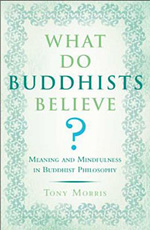"Buddhism rejects 'dualism.' Only by developing our consciousness of the profound connection between the causes we make and the effects we see in the world around us will we understand how best to live. We have to transform our greed, hatred, and ignorance into generosity, compassion, and wisdom. A new alchemy is needed. We must turn the poisons into medicine," writes Tony Morris, a history publisher, dedicated walker, and former board director of the Theatre de Complicite.
Buddhism is one of the oldest and most widespread religions with a history spanning 2,500 years. Its pragmatism and emphasis on the experiential make this path appealing to people in many different cultures. Morris sees this religion speaking to those who are interested in meaning and the following questions:
• "Philosophically: why are we born?
• "Historically: how did we get here?
• "Psychologically: who are we?
• "Morally: how should we behave?
• "Politically: what kind of society do we want?
• "Cosmically: where are we going?"
The author covers the basics with commentary on the Buddha; Buddhist scriptures; change, rebirth and karma; the Four Noble Truths; the Dharma and the Sangha; meditation; three poisons and five onenesses. Morris concludes with a chapter where he forecasts the future of Buddhism as a vibrant, living, and relevant tradition. He sees it attracting children of those who practice it already, those disillusioned with other religions, people journeying from one of the newer forms of religious expression and New Age philosophies, and individuals attracted to its pragmatic humanism, its ethics, and its psychotherapeutic insights.
